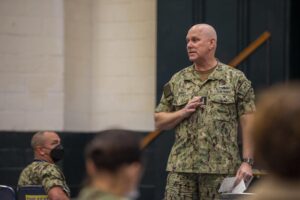President Biden has nominated Adm. Chris Grady, head of U.S. Fleet Forces Command, to serve as the next vice chairman of the Joint Chiefs of Staff.
Grady’s nomination arrives just weeks before Air Force Gen. John Hyten, the current vice chairman, is set to retire, with lawmakers expressing concern over a gap in the position between Hyten stepping down and confirmation of his successor.

“It’s still very unlikely, in terms of meetings, in terms of hearings, in terms of floor time – this will be a vote that we want to take on the floor – that we’re going to get this done in the proper amount of time without having a gap,” Sen. Dan Sullivan (R-Alaska), a member of the Senate Armed Services Committee, said during a press conference on Tuesday.
Grady, who has led Fleet Forces Command since May 2018, also concurrently serves as as the head of U.S. Naval Forces Northern Command, U.S. Naval Forces Strategic Command and U.S. Strategic Command Joint Force Maritime Component Commander.
Vice Adm. Daryl Caudle, who most recently led Naval Submarine Forces, Submarine Force in the U.S. Atlantic Fleet and Allied Submarine Command, has already been confirmed as Grady’s successor at Fleet Forces Command (Defense Daily, July 15).
In his new role, Grady will oversee the Pentagon’s Joint Requirements Oversight Council and take a lead role in spearheading further development of the department’s ongoing Joint All Domain Command and Control, or JADC2, initiative.
Hyten, who has served as the vice chairman since November 2019, recently cited his view that development of U.S. and allied sensors to detect and track hypersonic missiles is key to deterring their use and to destroying them via directed energy systems (Defense Daily, Oct. 28).
In September, Hyten said he was concerned over the Pentagon’s lack of dialogue with China on strategic stability issues, adding he’s particularly focused on what he called Beijing’s “almost unprecedented” nuclear modernization initiative (Defense Daily, Sept. 13).